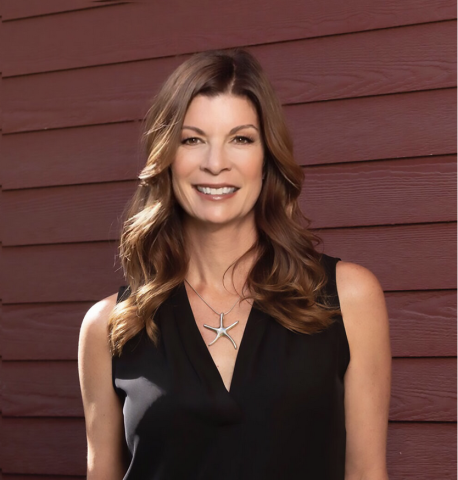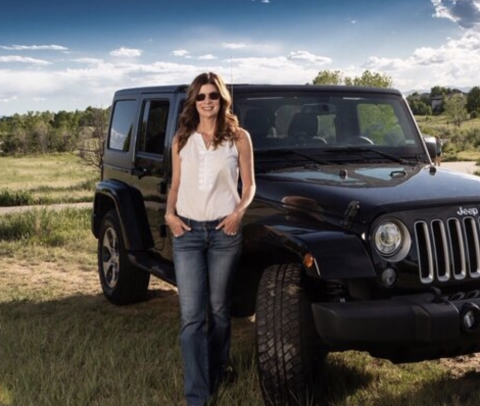Kathryn Haber
Psy.D.
With the turn of every new year, the feeling of a fresh start is upon us: calendars resetting, the widespread proclamation of resolutions, and an overwhelming hope for renewal. As we continue to embark on 2022, a certain GSPP alum offers us a mantra for a more fulfilling life: fear less, love more.
Dr. Kathryn Haber, organizational and clinical psychologist, is a graduate of the GSPP PsyD program. Currently, she works as the internal psychologist and executive coach at Ball Aerospace, a subsidiary of Ball Corporation in Broomfield, CO. She is in her fourth year of supporting executive leaders at Ball Aerospace during a season of tremendous growth in the organization.
Time at GSPP Sets the Stage
While in college and grad school, Kathryn found herself working part-time in business in human resource departments, observing organizational psychologists helping with things like organizational design, employee engagement, and change management. During her time at GSPP, Kathryn thought it might be interesting to combine her passion for psychology with business and create a career path forward as an organizational psychologist. Kathryn researched opportunities in this field for her internship placement and called on a firm in Denver, Somerville Partners (now NewPsy Systems), that specialized in helping organizations maximize competitive advantage by fully leveraging their human talent. She approached Kevin Somerville, the firm’s founder, and asked about creating an internship opportunity for her. “What was the worst he could say? No?”, Kathryn remembers. Kevin’s response was “I was your age when I got my first break. Sure, why not?” This simple ask turned into the start of a flourishing, remarkable, and purpose-driven career path for Kathryn.
Upon finishing her internship at Somerville Partners and graduating from GSPP in 1998, Kathryn continued her work at Somerville and later made partner at the firm. She reflects on the transition from graduate school into the full time role at Somerville as “being a scary one – I was in board rooms with senior level executives and CEO’s. As someone in her late 20’s and fresh out of graduate school for clinical psychology, who knew very little about business, it was hugely intimidating.” With perseverance, Kathryn stuck with it – pushing past her fears and leaning into learning and believing in herself. After nearly ten years with Somerville Partners, Kathryn moved on to focus her attention towards starting a family and a leadership consulting practice of her own.
With a successful season focusing on her private practice and three sons, Kathryn later shifted back into the private sector. She went to work internally for one of her clients at the time, Florida Virtual School (FLVS), based in Orlando, FL. After a high-level leadership change at FLVS, Kathryn decided to look for her next opportunity. She was recruited by RHR International, a global consulting group of business psychologists, which she was keenly familiar with. RHR was a leader in the industry and well respected by many of Kathryn’s peers and colleagues. Accepting the job at RHR was an easy choice and as an organization comprised of psychologists, it was “a kind, respectful, and intellectually rewarding firm ”, she recalls. The opportunity allowed Kathryn to work with a diverse and elite set of companies and clients across the country. But after a couple of years at RHR, the number of hours a week she was dedicating to work and travel became too great. The desire to be more involved at home, with her sons and husband, began weighing on her. As you’ll read later, Kathryn had
experienced great loss in her family, and as a result knew all too well the cliché of life can be short. She wanted more time to spend with her children and husband and started to think about what could be next for her and her family.
Divine Intervention
Before reading what happens next, it’s important to know that Kathryn doesn’t believe in coincidences. “People and events in life come into our orbit for a reason, typically when we need them most. I think of it as divine intervention – the universe at play. I don’t think these things are coincidence or serendipity; I believe it’s all part of a larger purpose, one that we may not realize in the moment.”
In 2017, Kathryn was on a usual assignment for RHR, traveling to Washington DC for an executive assessment, which was a half day interview to determine if a specific candidate would be a good fit for an executive level role with one of Kathryn’s clients. During an executive assessment, the candidate typically completes a battery of psychological and leadership testing and undergoes a thorough interview. After all this, Kathryn compiles a comprehensive report on the candidate, making a recommendation back to the client. On the flight back to Denver, roughly four hours from D.C., Kathryn saw the flight time as the perfect opportunity to get ahead on the report so she could be fully present with her husband and boys when she walked through the door at home. Upon boarding the flight, she found her seat on the flight was in the very last row. At 5’11 with a computer and notes, Kathryn needed to spread out to work on the report. She made the rare decision to upgrade to first class that day so she could be productive and efficient with her time. The flight attendant escorted her to a seat next to a gentleman with Air Pods in his ears, unbothered and seemingly focused on something else. “Great – this is perfect. It’ll be a quiet flight; I’ll have no problem knocking out the first version of this report”, she vividly remembers thinking.
As the flight attendants took meal orders, Kathryn and the gentleman, seated next to her, ordered salads. A few minutes later, the flight attendant alerted Kathryn that they were out of salads and offered her the paella instead. Overhearing the conversation, the man said to Kathryn, “I’ll take the paella, you can have my salad.” From there, the two struck up a conversation. He expressed curiosity in what she was working on; “it was a pleasant, easy conversation”, she remembers. “At one point I said, ‘I love what I do, however my ideal job would be to work as an internal psychologist and executive coach for a mission driven organization.’” The gentleman, not missing a beat, responded, “Well I’m Rob Strain, President of Ball Aerospace. I wonder what it would take for you to come work for us.” True to his interest, a couple of days later Kathryn got a call from the Vice President of Human Resources following up and invited her to come formally interview at Ball HQ, which she did. Not long after, she started at Ball Aerospace, becoming their internal psychologist and executive coach.
Fearing Less
Far beyond and in addition to what’s mentioned above, Kathryn’s story demonstrates a consistent ability to assert herself and ask about opportunity where there seemingly isn’t any. If fearing less were a muscle, how did she learn to flex it so well?
As a teenager and the youngest of five siblings, Kathryn’s parents went through a divorce, which impacted her. “Given the divorce, my mother taught me to share my thoughts and feelings at an early age”, Kathryn explains. “She always encouraged me to ask for things I want in life, understanding that the worst someone could tell me was no.”
When her own boys were seven months old and three years old respectively, Kathryn was diagnosed with lymphoma cancer. “I remember being
incredibly scared,” Kathryn says. “I had to go through chemo, radiation, and was still working. I had lost my sister and dad only a few years prior, both to cancer. I was very close with them.” The loss she experienced was great, as both her sister and father were tremendous influences on her life. During her own cancer journey, stricken with fear, Kathryn arrived at a pivotal perspective shift: she realized she had no control of whether she lived or died. She began to pray to a higher power, God for Kathryn, surrendering total control of the situation. Relief began to wash over her and her panic turned to peace – which felt miraculous, given she wasn’t one to pray. “This act of surrender helped center me, let go of my fear, and release it to a higher power. Believing in something bigger than yourself, beyond this physical reality, can help people release one of the biggest fears in life: death”, she explains. Kathryn believes in an inclusive approach to spirituality, encouraging people to find a higher power to believe in whether it be God, Allah, The Universe, Buddha, the Source, or other figures of higher power that are meaningful.
Kathryn believes the ability to fear less is fueled by a combination of surrender, self-confidence, and humility. “I have confidence, but like everyone else, I have my own fears, doubts, and critical self-talk” she shares. The ability to believe in yourself or have confidence in your future, is coupled with self-love and self-compassion. “Confidence with arrogance doesn’t serve people well. Conversely, confidence with humility is really helpful. It demonstrates a humbleness and vulnerability that others prefer to be around.” Believing in oneself can help power the ability to fear less because in times of uncertainty and confusion, humble self-confidence may be just the reassurance you need to lean in, breathe, center yourself, with a knowing that whatever happens, all will be okay.
Loving More
As fear lessens, we make room for love to expand. The choice to live every day from a place of love is intentional. Kathryn explains that “when we operate from a place of love, compassion and gratitude, our energy that surrounds us and life become more positive.” Being confronted with so much loss, between her sister and father earlier in life to more recently losing her mother and brother to pancreatic cancer, and facing a cancer scare of her own, Kathryn poignantly learned just how important relationships, treating people well, and helping others truly are. Scientifically, Kathryn explains, “When we operate out of a place of love, we’re physiologically omitting feel-good chemicals of dopamine, serotonin, or oxytocin and the recipients of our love feel grateful – then omit their own feel-good chemicals in return.”
The Year Ahead
As the first weeks of 2022 continue to unfold, Kathryn encourages us to spend time reflecting on our own core values. She describes an exercise she does with many of her executive-level clients: review your own personal values – the values that you lead your life with. (Don’t have a set of personal values? Learn how to create some here.) After you review these, ask yourself this series of questions to help you think about past, present and future actions. Jot down your answers:
- Have I been living in alignment with my core values recently?
- What decisions am I making or behaviors I’m engaging in that are not in alignment with my core values?
- What decisions or behaviors can I step into this year that are reflective of my core values?
For example, one of Kathryn’s core values is gratitude. “With the last two years of the pandemic, the news can be overwhelming. It’s important to know our level of intake when it comes to reading or watching the news because starting each day with everything that’s wrong in the world can set the tone for the whole day. I’d rather start my day with the things I’m grateful for” she explains. Every day, she finds time to express gratitude through prayer, quiet time or with others – a behavior that is grounded in one of her core values.
Wisdom and Advice from Kathryn
- For people who have made mistakes and regret past decisions and may have some shame associated, “I always encourage them to allow for forgiveness, self-compassion and self-love and start making better choices moving forward. The more you hang on to that shame, it will continue to impact your life in a negative way.” Surrender things that don’t serve you well.
- Lean into vulnerability in 2022. Kathryn shares that, “sharing our stories and being transparent, is what connects us with others; it allows us to be real. These authentic stories build trust and build community to help us navigate life’s journey of twists and challenges.” She reflects on her own cancer journey and how concerned she was about protecting her ego; she didn’t want people to know about her cancer, didn’t want people to pity her as someone with cancer and three babies under three who had just lost her father and sister to cancer. “When I look back, I think ‘Oh my gosh I was so concerned about what others thought', which I completely regretted years later - because I’m sure I would have received a lot of love and compassion if I had opened up to others and was transparent with what was going on.”
- Consider living more of an eco-centric life than an ego-centric one. The eco-centric person thinks beyond themselves and looks for how they can better the whole or ecosystem, by contributing to the greater good. On the contrary, an ego-centric individual perceives the world through a lens of ‘me’ or ‘I’ – what can I get from this situation? What does this person have to offer me? From Kathryn’s experience, she has “noticed that people who are in an ego-oriented space are often exhausted. It takes so much energy to be concerned about protecting or serving yourself, and it doesn’t yield much return. Those who are more ego-centric also tend to attract negative energy which can lead to stress and be detrimental to our health. Conversely, those who are living an eco-centric life, have a more positive energy and are a joy to be around.”
- Add Fear Less, Love More: What to Do When the Unexpected Happens, Five Daily Choices to your 2022 reading list. You can find it on Amazon, Barnes and Noble, and other retailers or on Kathryn’s website: www.kathrynhaber.com. The book was recently ranked number one on the Amazon new releases list and is illuminated by her personal and professional experiences as a clinical and organizational psychologist and corroborated by the works of spiritual leaders such as the Dalai Lama, Archbishop Tutu, and Marianne Williamson. It provides practical recommendations that readers can apply immediately to overcome their fears and move through life’s challenges.




